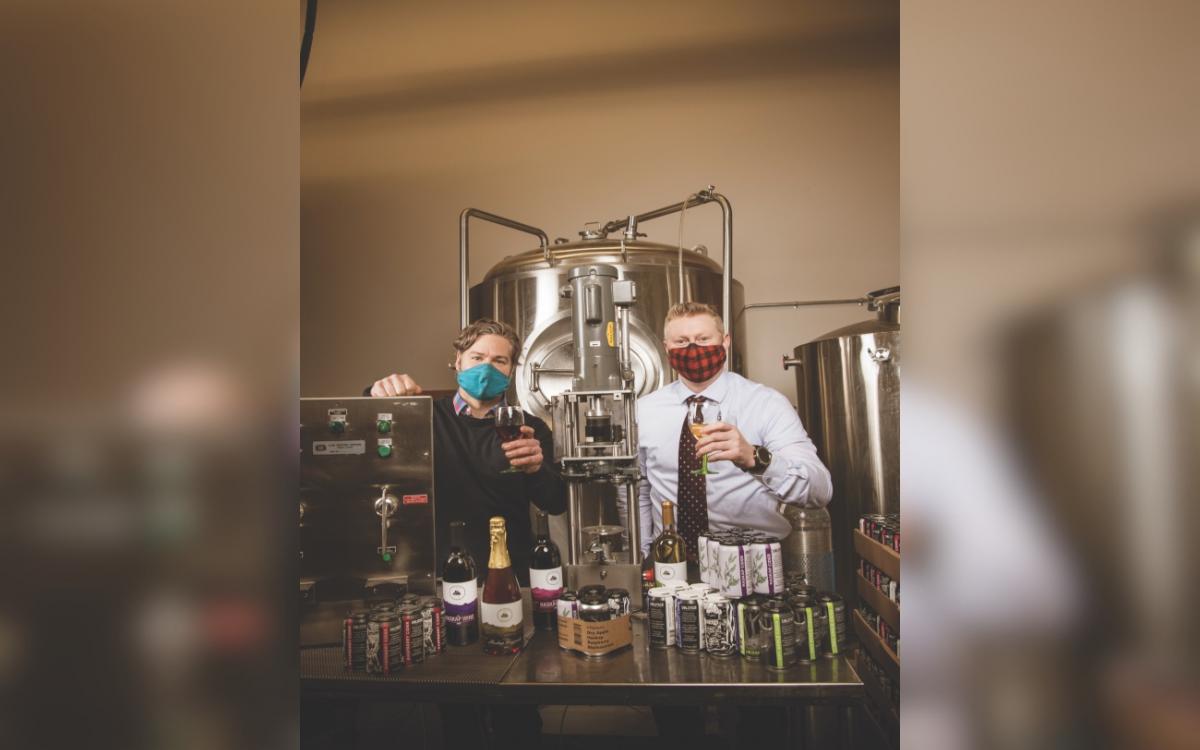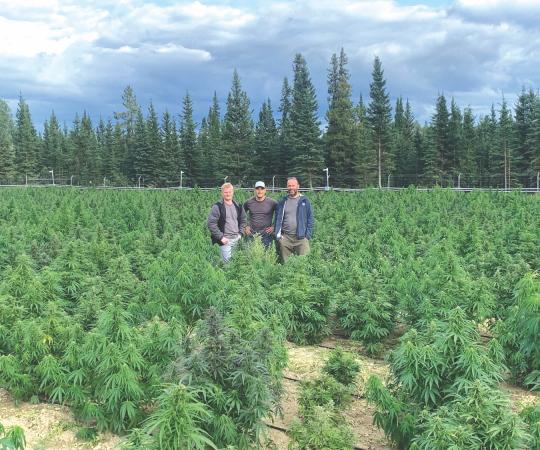Yukoners welcomed a first in May 2020 with the launch of a pair of new companies, Yukon Wines and Solstice Ciderworks, by local entrepreneurs Kyle Marchuk, Stephen Mooney, Colin Nickerson, and Harold Roche. Nobody had ever started a wine or cider business before in the territory, and the drinks were greeted with enthusiasm. The first batches of wines and ciders sold out at the Whitehorse liquor store within two days.
That was the good news, at least. Behind the scenes, the sister firms were finding their way through the challenges of introducing new businesses and new products as the territory—and the country—was coming to grips with the first wave of COVID-19. Lockdowns, restrictions on work conditions and supply shortages created multiple challenges for the new companies—everything from controlling supply chain costs to difficulties in getting materials such as sugar or paper for product labels shipped up.
“The action and movement towards getting the product out, the pandemic didn’t affect that,” says Mooney, who is the former director of cold-climate innovation at the Yukon Research Centre. “What did affect us was getting the goods up, increased shipping costs, the supply chains.” Marchuk adds that the cost of freight escalated quickly. “One pallet could cost 200 bucks, now it cost $800—maybe $600 if you get a discount.” And they had to have redundancy built into their operations. If a piece of equipment required repair, they needed backup parts as it might take weeks—even more than a month—for replacements to arrive.
But the ability to adapt quickly is part of the entrepreneurial DNA for Yukon Wines and Solstice Ciderworks. The companies are the offspring of another firm, Yukon Berry Farms, which Marchuck helped found in 2014 to introduce haskap berry agriculture to the territory.
Rich in antioxidants, haskaps look like an elongated blueberry and are touted as a superfood. They are savoured in many parts of the world, most notably in Japan where they are especially popular, and can grow well in cold climates. The cultivar grown at Yukon Berry Farm was developed at University of Saskatchewan; it crosses a hardy but sour Siberian breed with a sweet one indigenous to Japan.
Yukon Berries started business intending to become a haskap exporter and scored some early success when one of its jams proved successful at a food festival in Tokyo. By the end of 2018, the company’s operations had grown to 40,000 plants covering 40,000 acres. “Then we learned in January 2019 that the Canadian Food Inspection Agency had changed some of its rules to make it more strict for food exports out of the Yukon to British Columbia and Alberta, let alone other countries,” Marchuk says.
So, Marchuk and the team started to consider what products they could export with less red tape. Among the options was alcohol. Making wine from haskaps and bringing up apples from the Okanagan for Solstice Ciders was a hard left turn from jam. But it made sense, so the entrepreneurs tapped into the Yukon Business Development Program to bring up experts as consultants. Among them was a winemaker who helped them envision what their new product could be. “It was a bit more exciting than jam,” Mooney quips.
Local reception of the wines and ciders has given the founders of the companies good reason to raise a glass in celebration. Their focus has turned to finding markets beyond the Yukon for their creations. “We’re looking to export this product,” Mooney says. “We truly want to be one of Yukon’s first agricultural products that has been exported not only nationally but internationally.”
Lessons Learned: Launching Into A Downturn
Work Your Supply Chain.
Managing costs is critical for business, all the more so when external factors—a pandemic, say—are driving costs upwards. “We try to organize in advance what we may require from multiple locations and have them delivered to one location where they can be consolidated and shipped up on one truck. It takes a bit of juggling,” Marchuk says. “We’ve also shared shipping costs with some other local businesses that are bringing up items from a similar location. For example, Al Stannard, owner of Little Red Hen (egg farmer) gave us a shout and asked if we wanted to share the cost to bring a flat truck to the Yukon.”
Think Local.
One of Solstice Ciders products is a variety four-pack it calls “Cider Fix.” When planning the product, Marchuk and Mooney weighed ordering customized cardboard boxes from a southern supplier. But the limited number they needed, measured against the cost of a custom die required to make the boxes, proved too pricey. “We ended up going with a local company,” Marchuk says. “We wrapped our cider cans with recycled paper, which ended up costing far less, gave the product a unique look, and is better on the environment.”
Focus On The Big Picture. The decision to introduce Yukon Wines and Solstice Ciderworks is central to Yukon Berry Farm’s larger goal of exporting haskap products to national and international markets. “Our goal is to increase the value of products that we’re growing here in the Yukon,” Mooney says. “The haskap berries—we could make jams and jellies. There’s a lot of products you can make with the haskap berries that do well here. But we looked into wines because as the business grows, the Yukon market is not going to sustain us.”
Marchuk travelled to Japan in the early days of the business and has since been in talks with an exporter to get the product to Vancouver and then overseas. “A fruit wine is unique,” he says. “The reason we are targeting Japan is because the haskap is a Japanese berry. There’s a connection to the berry and a respect for the berry. We wanted to make a higher-end product that we could sell.”










